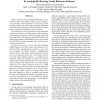Free Online Productivity Tools
i2Speak
i2Symbol
i2OCR
iTex2Img
iWeb2Print
iWeb2Shot
i2Type
iPdf2Split
iPdf2Merge
i2Bopomofo
i2Arabic
i2Style
i2Image
i2PDF
iLatex2Rtf
Sci2ools
127
click to vote
RTAS
2005
IEEE
2005
IEEE
Bounding Worst-Case Data Cache Behavior by Analytically Deriving Cache Reference Patterns
While caches have become invaluable for higher-end architectures due to their ability to hide, in part, the gap between processor speed and memory access times, caches (and particularly data caches) limit the timing predictability for data accesses that may reside in memory or in cache. This is a significant problem for real-time systems. The objective our work is to provide accurate predictions of data cache behavior of scalar and non-scalar references whose reference patterns are known at compile time. Such knowledge about cache behavior provides the basis for significant improvements in bounding the worst-case execution time (WCET) of real-time programs, particularly for hardto-analyze data caches. We exploit the power of the Cache Miss Equations (CME) framework but lift a number of limitations of traditional CME to generalize the analysis to more arbitrary programs. We further devised a transformation, coined “forced” loop fusion, which facilitates the analysis across sequen...
Related Content
| Added | 25 Jun 2010 |
| Updated | 25 Jun 2010 |
| Type | Conference |
| Year | 2005 |
| Where | RTAS |
| Authors | Harini Ramaprasad, Frank Mueller |
Comments (0)

